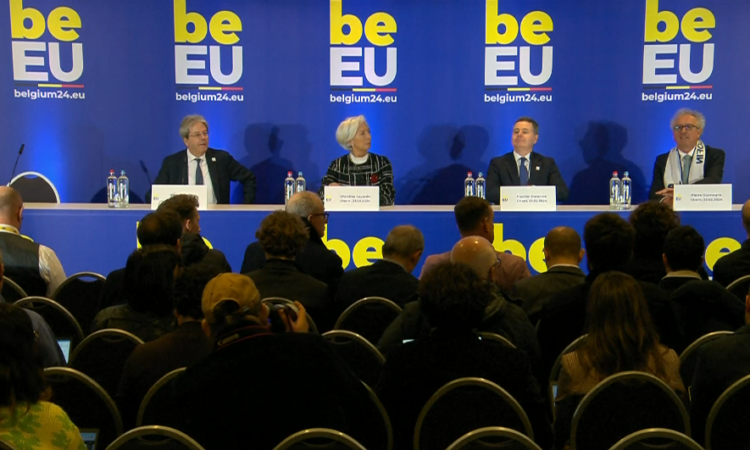
Brussels – The European Union needs money it does not have when so much of it is sleeping in banks and could be used to finance the economy. These are household savings sitting idle in current accounts, which could be put into the economy to stimulate a eurozone grappling with liquidity needs that states cannot guarantee. With this in mind, the still missing capital market union must be made a reality. The Eurogroup, which met in Ghent (northern Belgium) for an informal working session, is starting a follow-up discussion.
The President of the European Central Bank, Christine Lagarde, offers numbers that help understand the scale of the challenge. “From 2031, we will need 800 billion euros a year to meet the European targets of a 90 per cent reduction in greenhouse gas emissions by 2040.” Total: eight trillion by 2040. And then, Lagarde reminds us, “We need €75 billion a year to meet the NATO spending target of 2 per cent of GDP for defence.” Thus, “ambition” is needed, but above all, determination in political action. Third numeric element: “About €250 billion, or 1.8 per cent of European GDP, leave Europe to go elsewhere, mainly to the United States.”
There is a European wealth that does not benefit Europe. Stopping the money outflow does not appear possible, and finding the money needed is far from easy. At the state budget level, “there is not a lot of money available,” admits Bruno Le Maire, France’s finance minister. But, on the other hand, there is idle available money, and plenty of it. “Europeans’ savings amount to €35 trillion, and a third, more than 10 trillion, are sleeping in bank accounts. That’s money sleeping and not working, when Europeans’ money is supposed to contribute to growth, research, employment.”
Very sensitive public statements, those of Le Maire, which risk creating ill-feeling. But the key is all here, in knowing how to “mobilize household savings, which are important for sustaining our challenges,” acknowledges Vincent van Peteghem, finance minister of Belgium, the country with the rotating presidency of the EU Council. This will be the key. But it will have to be done right. Hence, the French initiative for a capital markets union.
Le Maire brings to Ghent his idea of a capital union “voluntarily” as a lever to stir up the money sleeping in bank accounts. Open to a small number of countries (“four or five would be a good starting point,” says the French minister) and with the ESMA, the European Securities and Markets Authority, in the role of overseer of states and credit institutions. Hence, a European savings product will need to be worked on to define requirements and yields. The third element of the proposal is a guarantee for securitization so that securities stop burdening banks’ balance sheets and banks can lend more to individuals. France is, therefore, trying to change pace. Le Maire would like tangible progress as early as this year, “in 2024,” and seeks partners. The debate is on, and the issue is on the table. The coming months will tell, especially to holders of savings, how the European Union and its eurozone will decide to act.
English version by the Translation Service of Withub





